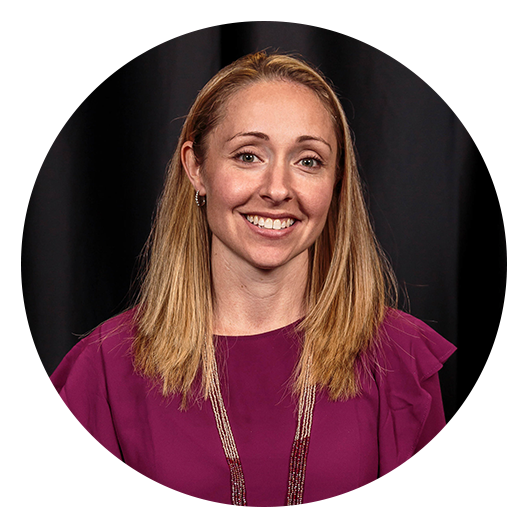Active Minds is headquartered in Washington D.C., and for many years, I was too. I went into the office each day on a consistent schedule, and from there, it felt easy to achieve a work/life balance. I gave my all to our team in the office and was able to focus on my loved ones and personal life at home. However, I eventually ended up relocating across the country. I knew I would miss seeing my team every day in person, but my family was excited for a change of pace – in the times that we weren’t working and going to school, we’d have more opportunities for activities and time outdoors. But I soon found that trying to stretch myself across coasts left me feeling worn down, and my mental health and connection with my team suffered as I tried to continue to operate the same way I had in D.C.
I knew that something needed to change, but what I didn’t expect was that the change would be inspired by a pandemic, shifting us all into remote work and changing workplace standards overnight. But, by forcing myself to slow down, be more flexible, and move away from traditional workplace norms, I found tactics that have helped me to be a better leader, my workplace to be a more productive and caring environment, and those around me to feel more heard, understood, and appreciated.
Now, as we rebuild and recover, I’m reflecting on all that I’ve had the opportunity to learn and embrace through these last two years. Across the board, each policy I pursue and each action I take points to one overarching theme: creating an inclusive workplace that prioritizes mental health while striving toward fulfilling our mission.
Here are three lessons I’ve learned that have helped to center well-being in the workplace while also remaining functional, constructive, and focused.
Flexibility creates a more positive, inclusive, and productive workplace.
We’ve all had to learn to adjust – in our personal and professional lives alike. We’ve learned that being able to pivot when needed is a wonderful skill. Offering flexibility that focuses on equity rather than just equality makes workplaces more diverse and inclusive. Some examples of flexibility that are conducive to employee well-being and productivity as well as inclusive are offering flex scheduling with a set of base “in-office” hours, remote work options and hybrid workweeks, and giving employees the autonomy to manage their day in a style that works best for them. By offering understanding, compassion, and as much flexibility as possible for our team’s unique circumstances, such as child and pet care, family life, appointments, or classes, we can help them to feel valued and potentially reduce overwhelm, and therefore be more productive and content.
Promoting a realistic and healthy work/life balance is crucial.
More and more, top-performing workplaces are realizing that productivity comes not from strict work schedules and from rewarding employees who put in overtime. Instead, we’re seeing time and time again that organizations that prioritize a healthy work/life balance see higher levels of productivity, longevity in a job, and overall more content employees. At Active Minds, we know our team are people first, and we want them to have time to be with loved ones, focus on hobbies, and of course, get the necessary rest they deserve. To ensure that this is possible, we offer company-wide mental health days. On these days, the Active Minds office is closed and employees are encouraged to set an out-of-office responder on their email and get away from their computers. As mentioned before, we also recognize that some of our team members have childcare obligations, necessary appointments to attend, and unforeseen circumstances that arise. Therefore, on days we are open, our flex scheduling allows our team to take care of themselves and their loved ones without being penalized for adjusting their schedule.
There are big and small ways to emphasize employee well-being.
Finally, during work hours, focus on promoting workplace norms or policies that make your organization’s environment one that is welcoming, encourages healthy boundaries, and is psychologically safe. One way to do this is by providing optional opportunities for employees to connect and learn more about one another, both virtually and in person. We’ve done everything from virtual yoga lessons, to trivia games, to coffee happy hours, to twice-annual all staff retreats – all non-mandatory, but all a time for colleagues to gather without the pressure to discuss work-related tasks. Another way for team members to feel supported and lessen the chance of burnout occurring is to encourage employees to set healthy boundaries. For example, once a week, we have a company-wide policy for no internal meetings to be scheduled during an afternoon to give our team time to work on their own tasks without interruptions. Additionally, we encourage our team to take lunch breaks away from their computer, block off “focus time” when needed, and disconnect after work hours.
These new practices, while focused on employee well-being first and foremost, haven’t slowed down our productivity one bit. In fact, it’s done the opposite – in the 2022 year, we’re on track to double our team, further expand our reach, and hit new milestones as we approach our twentieth anniversary next year. We don’t have to sacrifice mental health to have success. This is true not only professionally, but also in our personal lives. This week, as part of Mental Health Month, we’re sharing thirty-one simple ways you can prioritize mental health in your everyday life, to add a new layer of well-being while not sacrificing anything else you have on your plate. We hope these tips help to make your workday more productive, your day-to-day more enjoyable, and your mental health stronger.




